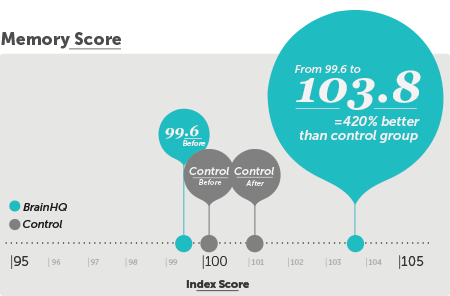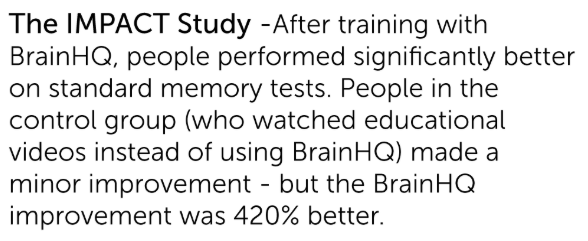Published Research on BrainHQ and Memory
Of all cognitive abilities, memory is one that feels particularly important to many of us. Having a sharp, effective memory makes people more confident—having memory lapses can leave them feeling insecure.
To date, fifteen scientific papers—conducted by well-regarded researchers at  respected universities in a variety of populations—have shown that using BrainHQ exercises can have a substantial impact on memory performance. Here are some highlights:
respected universities in a variety of populations—have shown that using BrainHQ exercises can have a substantial impact on memory performance. Here are some highlights:
 The IMPACT study—a large study from researchers at the Mayo Clinic and the University of Southern California—followed 487 people, and showed an average improvement of 10 years in auditory memory…meaning that if you began the study with a memory typical of a 52-year-old, you would (on average) leave with a memory typical of a 42-year-old. Two smaller studies showed similar results.
The IMPACT study—a large study from researchers at the Mayo Clinic and the University of Southern California—followed 487 people, and showed an average improvement of 10 years in auditory memory…meaning that if you began the study with a memory typical of a 52-year-old, you would (on average) leave with a memory typical of a 42-year-old. Two smaller studies showed similar results. Multiple research papers have demonstrated “generalization” beyond trained tasks to standard memory tests. This is very important, and rarely shown for any other brain-training program. It means that the memory gains represent a real change in cognition, not just an improvement in a memory strategy.
Multiple research papers have demonstrated “generalization” beyond trained tasks to standard memory tests. This is very important, and rarely shown for any other brain-training program. It means that the memory gains represent a real change in cognition, not just an improvement in a memory strategy. A pilot imaging study showed that using BrainHQ exercises increased activity in areas of the brain associated with memory.
A pilot imaging study showed that using BrainHQ exercises increased activity in areas of the brain associated with memory.
Information and citations for memory-related articles
In general, these studies were conducted in cognitively healthy adults aged 65 and older, and in some cases, aged 50 and older. Remember that studies show average results, and that individual results will vary. Where published studies make reference to clinical populations, it is for informational purposes only. BrainHQ is not intended to diagnose or treat any clinical condition.
Reversal of age-related neural timing delays with training
Anderson et al. (2013)
Proceedings of the National Academy of Sciences
View article
Gains in cognition through combined cognitive and physical training: the role of training dosage and severity of neurocognitive disorder
Bamidis et al. (2015)
Front Aging Neurosci
View article
The influence of perceptual training on working memory in older adults
Berry et al. (2010)
PLoS One
View article
The Effects of a Computer-Based Cognitive and Physical Training Program in a Healthy and Mildly Cognitive Impaired Aging Sample
González-Palau et al. (2014)
Aging & Mental Health
View article
Neural plastic effects of cognitive training on aging brain
Leung et al. (2015)
Neural Plasticity
View abstract
Brain plasticity and functional losses in the aged: Scientific bases for a novel intervention
Mahncke et al. (2006)
Progress in Brain Research
View abstract
Memory enhancement in healthy older adults using a brain-plasticity-based training program: A randomized, controlled study
Mahncke et al. (2006)
Proceedings of the National Academy of Sciences
View article
Neural plasticity underlying visual perceptual learning in aging
Mishra et al. (2015)
Brain Research
View article
Adaptive training diminishes distractibility in aging across species
Mishra et al. (2014)
Neuron
View article
Cognitive training changes hippocampal function in mild cognitive impairment: A pilot study
Rosen et al. (2012)
Journal of Alzheimer’s Disease
View article
A combination of physical activity and computerized brain training improves verbal memory and increases cerebral glucose metabolism in the elderly
Shah et al. (2014)
Translational Psychiatry
View article
A cognitive training program based on principles of brain plasticity: results from the improvements in memory with plasticity-based adaptive cognitive training (IMPACT) study
Smith et al. (2009)
Journal of the American Geriatric's Society
View article
Cognitive function in elderly can be ameliorated by training in temporal information processing
Szelag et al. (2012)
Restorative Neurology and Neuroscience
View article
Improvement in memory with plasticity-based adaptive cognitive training: Results of the 3-month follow-up
Zelinski et al. (2011)
Journal of the American Geriatric's Society
View article
Evaluating the relationship between change in performance on training tasks and on untrained outcomes
Zelinski et al. (2014)
Frontiers in Human Neuroscience
View article






 English
English
 Français
Français


